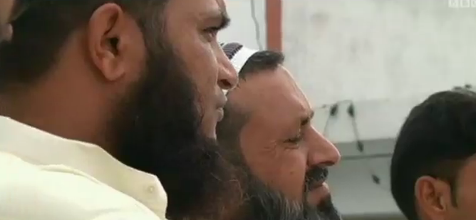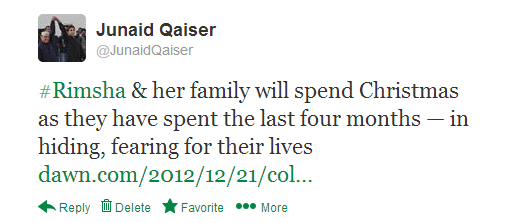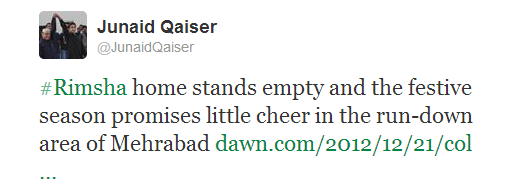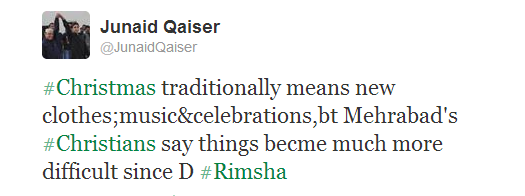Arrest of Ramsha, 11, yet another proof Pakistan must reform its blasphemy laws
A Duke University professor has stated that the recent arrest of a disabled Pakistani Christian girl in the Islamic Republic is part of a decades-old trend in “witch hunts.”
Ebrahim Moosa, professor of Religion & Islamic Studies for Duke’s Department of Religion, said in comments published by Duke on Monday that the practice had “ruined Pakistan‘s reputation for decades.”
In an interview with The Christian Post, Moosa explained that in Pakistan from 1986 to 2007 there were 647 charges filed against people on the charge of committing blasphemy. About half of those charged were Muslim.
“Twenty suspect blasphemers have been assassinated by vigilantes. Scores of accused languish in jails for years until the charges are withdrawn or prosecutions fail,” said Moosa.
“The national and international media have repeatedly highlighted these events. Several moderate parliamentarians, governors and cabinet ministers have called for a review of the blasphemy laws.”
According to Moosa, Pakistan’s blasphemy laws go back to when the British Empire ruled the region. After independence in 1947 they were kept and later updated under the martial presidency of General Muhammad Zia-ul-Haq.
“Pakistan needs a serious national conversation about the public role of religion, before warring religious fanatics and their political handlers turn that society into an inferno of inquisitions,” said Moosa.
“The greatest tragedy is that moderate religious voices are not sufficiently forceful to stop this madness and have been cowered into silence by militants.”
Moosa’s remarks come in response to the news of an 11-year-old Christian girl once diagnosed with Down syndrome being arrested for allegedly desecrating an Islamic booklet.
The arrest of the girl, who was identified as Rifta Masih from a neighborhood near Islamabad, sparked denunciations from human rights groups and prompted Pakistan President Asif Ali Zardari to order an investigation of the case.
Moosa told CP that the charges against Masih “appear to be ‘dubious’ by several accounts inside Pakistan, as it is with most of these blasphemy charges.”
“There is sufficient evidence to indicate that she might not even have torched any scripture. It might have been newsprint with Arabic or Urdu,” said Moosa.
According to Jon Boone of The Guardian, the incident has exacerbated tensions between Muslims and Christians in and around Islamabad. In the community where the accusation took place, the Christians are primarily low income families and rent from Muslim landlords.
“Relations between the communities had been simmering for months after complaints were made about the noise coming from three churches in the area during religious services,” wrote Boone.
“Two of the landlords who owned the buildings had already ordered an end to worship and some services were forcibly broken up.”
Amnesty International reported last month that a homeless man in Pakistan’s Punjab province was accused of burning the Quran by a mob. After dragging him out of a police station, they proceeded to beat the unidentified man to death and set his corpse on fire.
Source: Christian Post
Amnesty International’s statement
The Pakistan government must urgently reform its blasphemy laws and ensure the safety of Ramsha Masih, a Christian girl arrested by police for allegedly committing an act of blasphemy, Amnesty International said today.
“This case illustrates the erosion of the rule of law and the dangers faced by those accused of blasphemy in Pakistan,” said Polly Truscott, Amnesty International’s South Asia director.
On Wednesday 17 August, Ramsha Masih and her mother were arrested by police in Islamabad, Pakistan’s capital. The police reacted under pressure from people who were demonstrating after a local preacher accused Ramsha of burning pages of a religious text. This is an offence that may be punishable with death under Pakistan’s blasphemy laws.
“Amnesty International is extremely concerned for Ramsha’s safety. In the recent past individuals accused of blasphemy have been killed by members of the public,” Truscott said.
On hearing the accusations, some residents of the neighbourhood attacked Ramsha Masih’s mother and other members of the local Christian community. Up to 300 Christian residents fled the area and the Masih family remains in hiding.
On 18 August, the President of Pakistan ordered an investigation into the case and called on the authorities to “protect the life and property of everyone”.
“Amnesty International welcomes the President’s swift response to this case, but the President’s actions will count for little unless they are followed by greater efforts to reform the blasphemy laws to ensure they cannot be used maliciously to settle disputes or enable private citizens to take matters into their own hands,” Truscott added.
“After four years of failing to deliver on repeated promises to review laws that are ‘detrimental to religious harmony’ like the blasphemy laws, now is the time for the Pakistan government to act.
“The continued failure to reform these laws has effectively sent the message that anyone can commit outrageous abuses and attempt to excuse them as defence of religious sentiments.”
Pakistan’s blasphemy laws make it an offence to destroy, damage or defile places of worship or sacred objects the Quran or Prophet Muhammad. The penalties range from a fine to life imprisonment or death.
But their vague formulation, along with inadequate investigation by authorities and intimidation by mobs, spurred on by some local preachers and religious groups, has promoted vigilantism in Pakistan and especially in Punjab province.
“The authorities must also ensure Ramsha Masih, a child, who reportedly suffers from downs syndrome, her family and Islamabad’s Christian community, are protected against intimidation and attacks,” said Truscott.
“The authorities must also prosecute all individuals that incite the community to commit acts of violence on the basis of the blasphemy laws.”
Religious minorities have been disproportionately accused of blasphemy. But a large proportion of victims are from the Muslim majority.





Ramsha’s arrest is a slap on our collective silence. But we are sleeping.
Nay, we are dead!